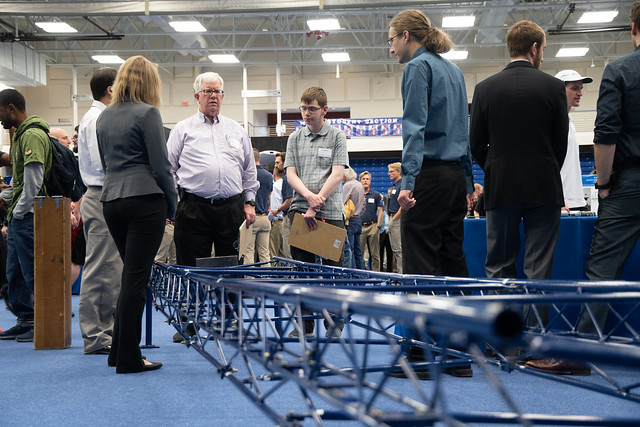A smart home monitoring system designed to be noninvasive, cost-effective and cause no permanent damage to install was awarded first place in the College of Engineering and Computational Sciences’ Spring Capstone Design Showcase on April 26.
Team Smart Wire’s system utilizes a suite of sensors to monitor the state of rooms – infrared motion sensors, light sensors and temperature sensors – instead of cameras and audio recorders. Information from the sensors is routed to an app installed on the residents’ phone or tablet, allowing them to easily observe the data over the course of a day. Residents can also receive notifications when certain rooms are active and control a room’s lights without needing to install special “smart” lights.
Making up the winning team were mechanical engineering students Garret DeCarlo, Brian LaPorta and Emily Nielsen and electrical engineering students Karl Samuelsen, Zifan Wang and Nicholas Zdeb.
Second place went to Recumbent Trike Loading Device, sponsored by the nonprofit organization Quality of Life Plus. Team members were Daniel DeCino, Brian Froechtenigt, Marc Hauser, Timothy Kelvin, Harrison LaVenue, Cameron Maxey and Robert Schreibman.
Third place went to the Winglet design for a PC-22 aircraft, sponsored by Sierra Nevada Corporation. Comprising the design team were Matej Cernosek, Spencer DeWitt, Jacob Englehart, John Fischer, Sarah Person, Jason Van Hare and Arthur Whitehead.
Projects also received awards for Most Innovative Design, Most Professional Team and Societal Impact/Human Systems.
Most Innovative Design went to the Downhole Tractor team, made up of Trevor Antrim, Sean Bell, Christopher Campbell, Christian Peterson, Frederico Rosendo and Trevor Thompson. The team was sponsored by Will Fleckenstein, director of strategic relationships and enterprises for the College of Earth Resource Sciences and Engineering.
The team behind the Laser Confocal Microscopy for 3D Printed Metal Parts project was named Most Professional. Keith Mody, Keaton Scheffler, Caleb Schelle, John Strang, Samuel Vaughn and Hannah Wright made up the team, which was sponsored by the Alliance for the Development of Additive Processing Technologies (ADAPT).
The Societal Impact/Human Systems Award went to the Human-Centered Design Studio project More Comfortable Shorty Sockets, sponsored by Quality of Life Plus. Leading the team were Joshua Glanzer, George Hunsinger, Adam Laine and Abigail Reuland.
In the Broader Impact essay contest, three mechanical engineering students swept the podium:
- First place: Samuel DeAngelo, “Smartphones and the Human Addiction”
- Second place: Calvin Swanson, “Human Datification and Algorithm-Based Society: An Unprecedented Threat to Democracy”
- Third place: Barathwaj Murali, “Individuality in Engineering”
“One thing John Persichetti, the Capstone Senior Design program director, noted to me is that there was an elevated sense of sponsor and client excitement this year about the quality of the work our students produce. I certainly agree,” said Kevin Moore, dean of the College of Engineering and Computational Sciences. “Mines students seem to get better and better each year.”
CONTACT
Emilie Rusch, Public Information Specialist, Communications and Marketing | 303-273-3361 | erusch@mines.edu
Mark Ramirez, Managing Editor, Communications and Marketing | 303-273-3088 | ramirez@mines.edu
Emilie Rusch, Public Information Specialist, Communications and Marketing | 303-273-3361 | erusch@mines.edu
Mark Ramirez, Managing Editor, Communications and Marketing | 303-273-3088 | ramirez@mines.edu




